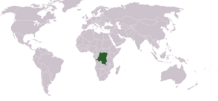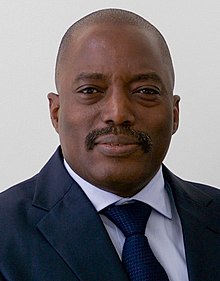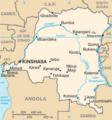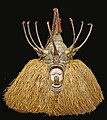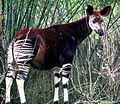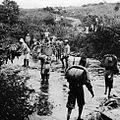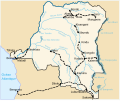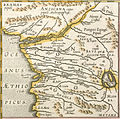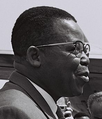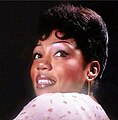Portal:Democratic Republic of the Congo
The Democratic Republic of the Congo Portal
The Democratic Republic of the Congo (DRC), also known as DR Congo, Congo-Kinshasa, or simply Congo, is a country in Central Africa. By land area the country is the second-largest country in Africa and the 11th-largest in the world. With a population of around 110 million, the Democratic Republic of the Congo is the most populous Francophone country in the world. The national capital and largest city is Kinshasa, which is also the economic center. The country is bordered by the Republic of the Congo, Central African Republic, South Sudan, Uganda, Rwanda, Burundi, Tanzania (across Lake Tanganyika), Zambia, Angola, the Cabinda exclave of Angola, and the South Atlantic Ocean. Centered on the Congo Basin, the territory of the Congo was first inhabited by Central African foragers around 90,000 years ago and was settled in the Bantu expansion about 3000 to 2000 years ago. In the west, the Kingdom of Kongo ruled around the mouth of the Congo River from the 14th to 19th centuries. In the center and east, the empires of Mwene Muji, Luba, and Lunda ruled from the 15th, 16th, and 17th centuries to the late 19th and early 20th centuries. King Leopold II of Belgium formally acquired rights to the Congo territory from the colonial nations of Europe in 1885 and declared the land his private property, naming it the Congo Free State. From 1885 to 1908, his colonial military forced the local population to produce rubber and committed widespread atrocities. In 1908, Leopold ceded the territory, which thus became a Belgian colony. Congo achieved independence from Belgium on 30 June 1960 and was immediately confronted by a series of secessionist movements, the assassination of Prime Minister Patrice Lumumba, and the seizure of power by Mobutu Sese Seko in a 1965 coup d'état. Mobutu renamed the country Zaire in 1971 and imposed a harsh personalist dictatorship until his overthrow in 1997 by the First Congo War. The country then had its name changed back and was confronted by the Second Congo War from 1998 to 2003, which resulted in the deaths of 5.4 million people and the assassination of President Laurent-Désiré Kabila. The war ended under President Joseph Kabila, who governed the country from 2001 to 2019 and under whom human rights in the country remained poor and included frequent abuses such as forced disappearances, torture, arbitrary imprisonment and restrictions on civil liberties. Following the 2018 general election, in the country's first peaceful transition of power since independence, Kabila was succeeded as president in a highly contentious election won by Félix Tshisekedi, who has served as president since. Since 2015, eastern Congo has been the site of an ongoing military conflict. The Democratic Republic of the Congo is extremely rich in natural resources but has suffered from political instability, a lack of infrastructure, corruption, and centuries of both commercial and colonial extraction and exploitation, followed by more than 60 years of independence, with little widespread development. Besides the capital Kinshasa, the two next largest cities, Lubumbashi and Mbuji-Mayi, are both mining communities. The DRC's largest export is raw minerals, with China accepting over 50% of its exports in 2019. In 2021, DR Congo's level of human development was ranked 179th out of 191 countries by the Human Development Index and is classed as a least developed country by the UN. As of 2018[update], following two decades of various civil wars and continued internal conflicts, around 600,000 Congolese refugees were still living in neighbouring countries. Two million children risk starvation, and the fighting has displaced 4.5 million people. The country is a member of the United Nations, Non-Aligned Movement, African Union, COMESA, Southern African Development Community, Organisation Internationale de la Francophonie, and Economic Community of Central African States. (Full article...) Selected article -Joseph Kabila Kabange (/kæˈbiːlə/ kab-EE-lə, French: [ʒozɛf kabila]; born 4 June 1971) is a Congolese politician who served as President of the Democratic Republic of the Congo between January 2001 and January 2019. He took office ten days after the assassination of his father, President Laurent-Désiré Kabila in the context of the Second Congo War. He was allowed to remain in power after the 2003 Pretoria Accord ended the war as the president of the country's new transitional government. He was elected as president in 2006 and re-elected in 2011 for a second term. Since stepping down after the 2018 election, Kabila, as a former president, serves as a senator for life. Kabila's term was due to expire on 20 December 2016, according to the terms of the constitution adopted in 2006. Officials suggested that elections would be held in November 2016, but on 29 September 2016, the nation's electoral authority announced that the election would not be held until early 2018. Talk focused on the need for a census before holding elections. In August 2018, Kabila announced that he would step down and not seek reelection in the December 2018 general election. (Full article...) General images -The following are images from various Democratic Republic of the Congo-related articles on Wikipedia.
This is a Good article, an article that meets a core set of high editorial standards.
 The Congo Crisis (French: Crise congolaise) was a period of political upheaval and conflict between 1960 and 1965 in the Republic of the Congo (today the Democratic Republic of the Congo). The crisis began almost immediately after the Congo became independent from Belgium and ended, unofficially, with the entire country under the rule of Joseph-Désiré Mobutu. Constituting a series of civil wars, the Congo Crisis was also a proxy conflict in the Cold War, in which the Soviet Union and the United States supported opposing factions. Around 100,000 people are believed to have been killed during the crisis. A nationalist movement in the Belgian Congo demanded the end of colonial rule: this led to the country's independence on 30 June 1960. Minimal preparations had been made and many issues, such as federalism, tribalism, and ethnic nationalism, remained unresolved. In the first week of July, a mutiny broke out in the army and violence erupted between black and white civilians. Belgium sent troops to protect fleeing white citizens. Katanga and South Kasai seceded with Belgian support. Amid continuing unrest and violence, the United Nations deployed peacekeepers, but UN Secretary-General Dag Hammarskjöld refused to use these troops to help the central government in Léopoldville fight the secessionists. Prime Minister Patrice Lumumba, the charismatic leader of the largest nationalist faction, reacted by calling for assistance from the Soviet Union, which promptly sent military advisers and other support. (Full article...) This is a Featured article, which represents some of the best content on English Wikipedia..
Jason Sendwe (1917 – 19 June 1964) was a Congolese politician and the founder and leader of the General Association of the Baluba of the Katanga (BALUBAKAT) party. He later served as Second Deputy Prime Minister of the Democratic Republic of the Congo (then Republic of the Congo) from August 1961 until January 1963, and as President of the Province of North Katanga from September 1963 until his death, with a brief interruption. Sendwe was born in 1917 in Mwanya, Kabongo Territory, Belgian Congo, to a ethnic Baluba family. He was educated in Methodist schools and nursing institutions. Unable to become a doctor due to a lack of medical schools in the Congo, he found work as a minister, teacher, and nurse. He became involved in several cultural organisations, and in 1957 founded BALUBAKAT to fight for the interests of the Baluba. He espoused Congolese nationalism and believed that the Congo should remain a united country after Belgian rule. In May 1960, shortly before the country's independence, he was elected to the newly constituted Chamber of Deputies. Sendwe sought to obtain control over the government of Katanga Province, but lost to a power struggle against his rival, Moïse Tshombe, and the Confederation of Tribal Associations of Katanga (CONAKAT) party. Regardless, Prime Minister Patrice Lumumba nominated him for the office of State Commissioner for Katanga. (Full article...)
WikiProjectsTopicsCategoriesRelated portalsAssociated WikimediaThe following Wikimedia Foundation sister projects provide more on this subject:
Discover Wikipedia using portals | ||||||



